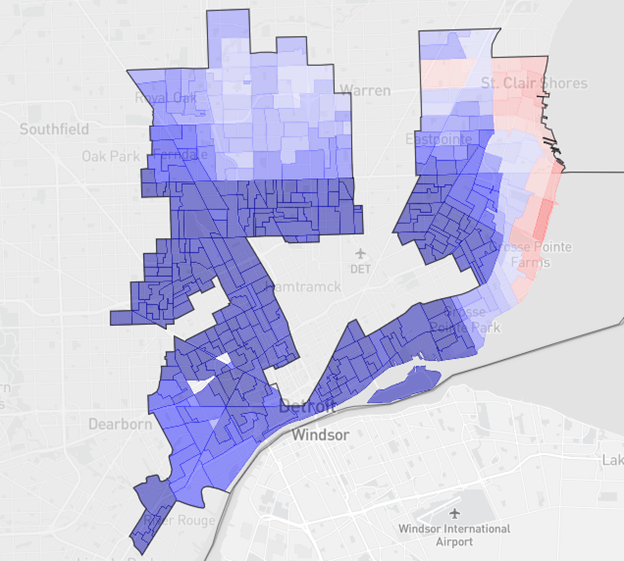In 2021, an Independent Citizen Redistricting Commission drew the district maps to be used in all elections to the Michigan legislature over the following decade. With the maps adopted by the Commission, Democrats win more seats than the number they would have won with the maps drawn by a Republican-controlled legislature in 2011. However, the Commission maps reduced the number of Michigan House and Senate districts where most residents identify as Black from thirteen to seven.
In the 2022 election, for the first time in forty years, Democrats gained a majority of seats in the Michigan House of Representatives. In 2023, a federal District Court struck down the new maps, finding that they violated the civil rights of Detroiters, as codified in the Equal Protection clause. The Court ordered seven Michigan House districts in and around the City of Detroit to be redrawn by February 2nd so that new maps can be adopted in time for the 2024 election.
In the wake of the Court's ruling, the Detroit Free Press questioned whether "the commission's maps benefited Democratic candidates at the expense of Black voters," and if so, it asks: "Will redrawn districts threaten Democrats' electoral prospects?" The answer is no: the Commission's maps benefited Democratic candidates elsewhere in Michigan, not in the seven unconstitutional House districts that must now be redrawn.
The effects on the partisan balance of power in the Michigan House of Representatives are not based on how Detroit districts are drawn. Yes, under the current map, the seven House districts struck down by the Court were all won by Democrats in 2022. However, the area mapped by these seven districts leans heavily Democratic. Observe in Figure 1 the colormap of the 2020 Presidential Election results by precinct, where precincts won by Biden are in blue and those won by Trump in red, with the intensity of the color proportional to the margin of victory. It is a sea of blue.

Figure 1. Partisan lean of the area must be remapped into 7 House districts.
If we draw any map of seven minimally compact districts in this area, Democrats win at least six of these seats; in fact, with most maps, they win all seven seats, as they did with the map used in the 2022 election. For instance, consider two recent proposals on how to redistrict this area: the map proposal released by IPPSR on 1/16 and the map suggested by Mr. Trende, an expert for the Plaintiffs in the Agee v Benson court case that struck down the 2022 map. With either the IPPSR or the Trende map, Democrats also win all of the redrawn districts, as in the Commission's 2021 map; if Michigan switched to the IPPSR map or the Trende map, there would be no partisan consequences.
Acknowledging that fixing the seven unconstitutional districts would affect other districts' boundaries, the Court ordered that other districts be redrawn as well "as reasonably necessary." As long as the limited remapping effort is constrained to the seven districts ruled unconstitutional and to other adjacent districts, the partisan balance of power in the Michigan House of Representatives is likely to be unaffected by this remapping effort; the most a hypothetical pro-GOP gerrymander could attain is to gain one seat, as in the following example in Figure 2.

Figure 2. A district Trump would have won 50%-49% over Biden in 2020.
Even with everything drawn in its favor, the GOP barely wins this hypothetical district, and every precinct to be redrawn outside it is one that Democrats win. The main takeaway is that as long as the redistricting effort is constrained to the districts struck down by the Court (namely, districts 1, 7, 8, 10, 11, 12, and 14) and the ones adjacent to them in the City of Detroit (namely, 4, 6, 9 and 13), the partisan effect of redrawing these districts on the composition of the Michigan House of Representatives will be at most one seat, and most likely none whatsoever. Instead, the effect of redrawing these districts will be to restore the civil rights of Detroiters under the Equal Protection clause in the U.S. Constitution.
Jon X. Eguia, Professor of Economics, Michigan State University